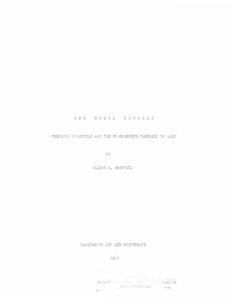| dc.rights.license | In Copyright | en_US |
| dc.creator | Brownell, Blaine Allison | |
| dc.date.accessioned | 2023-04-21T19:30:31Z | |
| dc.date.available | 2023-04-21T19:30:31Z | |
| dc.date.created | 1965 | |
| dc.identifier | WLURG038_Brownell_thesis_1965 | |
| dc.identifier.uri | https://dspace.wlu.edu/handle/11021/36185 | |
| dc.description.abstract | The year 1912 was an exciting one, and the Taft- Roosevelt feud that it symbolizes is complex and confusing. Allan Nevins, in his Gateway to History, has stated the problem succinctly: "We decide by preliminary survey that Roosevelt broke with Taft in 1911 because he wanted a third term in 1912; how much easier just to pick out enough facts to prove it! A vast deal of so- called history is indeed written in that fashion. It is always easier to write, usually to read, and open to only one objeotion -- it usually misses the truth." I have tried to avoid these pitfalls, and yet I have also attempted to reveal something of Theodore Roosevelt and something of the progressive era
that the year 1912 tends to summarize. I have tried to bring to light some of the passions, the fears , the hatred, and the sorrows that human nature inscribes on the face of history, and yet inevitably they become largely obscured in the depths of men's minds, never to be fully recorded. We might learn much from Hemingway's dictum that the one tenth of the iceberg that we can see and analyze is but a partial representation of the thoughts and emotions that lie beneath. The year 1912 was a boom year for crusading in American history, and since crusades are rarely launched on the basis of rational considerations; much of this work will deal with psychological and emotional intangibles. It is an attempt, primarily, to determine Theodore Roosevelt's place in the context of 1912, and the principal emphasis will lie in the preconvention campaign between Roosevelt and Taft, for it was here that the election in November was decided. A crusade is an event of absorbing interest, of deep fascination, to a historian. It is a phenomena that demonstrates both the best and the worst in men. The Great Crusade for Progressive Democracy in 1912 was no different. [From Preface] | en_US |
| dc.format.extent | 126 pages | en_US |
| dc.language.iso | en_US | en_US |
| dc.rights | This material is made available for use in research, teaching, and private study, pursuant to U.S. Copyright law. The user assumes full responsibility for any use of the materials, including but not limited to, infringement of copyright and publication rights of reproduced materials. Any materials used should be fully credited with the source. | en_US |
| dc.rights.uri | http://rightsstatements.org/vocab/InC/1.0/ | en_US |
| dc.title | The Great Crusade: Theodore Roosevelt and the Progressive Campaign of 1912 | |
| dc.type | Text | en_US |
| dcterms.isPartOf | WLURG38 - Student Papers | |
| dc.rights.holder | Brownell, Blaine Allison | |
| dc.subject.fast | Roosevelt, Theodore, 1858-1919 | en_US |
| dc.subject.fast | Politics and government -- United States | en_US |
| dc.subject.fast | Progressive Party (U.S. : 1912) | en_US |
| dc.subject.fast | National Progressive Convention | en_US |
| local.department | History | en_US |
